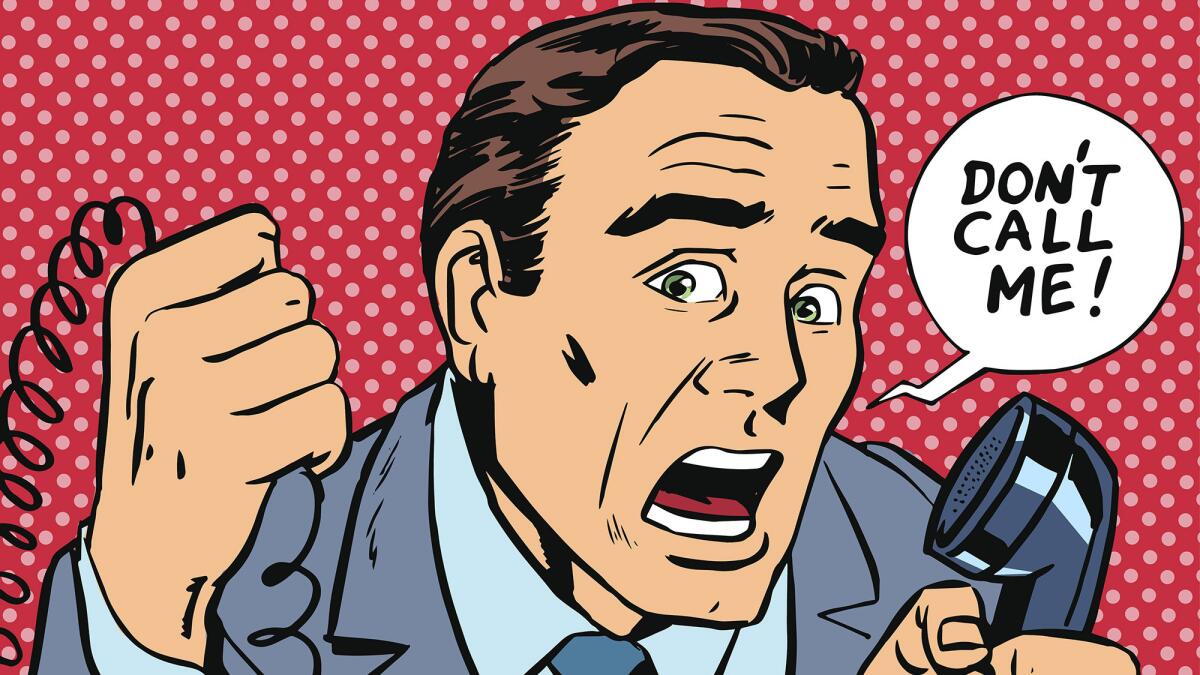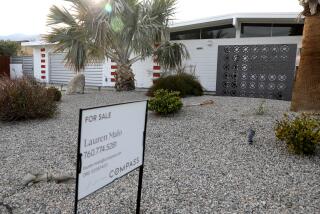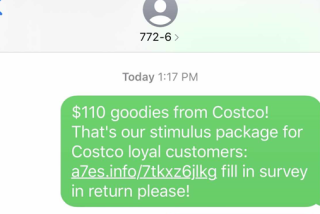Column: We’re swamped with 182 million robocalls a day. Is a solution finally here?

- Share via
There was good news and bad news this week on the robocall front. Let’s start with the bad news.
A record 5.7 billion robocalls inundated Americans last month, up 25% from a month before, according to the latest figures from YouMail, a robocall-blocking app.
That translates to an average 182 million robocalls a day, or 2,115 per second.
Roughly 49 billion robocalls have been received so far this year, which is more than all of last year. In other words, there have never been more robocalls being made in the history of human civilization.
Alex Quilici, YouMail’s chief executive, said that by the time we reach the end of December, U.S. consumers likely will have received almost 60 billion robocalls.
“There’s a long way to go before the robocall problem is solved,” he said.
So what’s the good news, you ask?
Telecom industry insiders say work is rapidly progressing on a system called “Shaken/Stir,” which may not end the scourge of robocalls but could go a long way toward making your phone usable again.
“I wouldn’t bet this is the end of robocalls,” said Mark Cooper, president of PKI Solutions, a Portland, Ore., cybersecurity consulting firm. “They’re a business. They’ll find other ways to do it.”
However, he told me that Shaken/Stir can do for phones what spam filters did for email. Yes, you still get junk messages in your inbox every day. But the flow is manageable and no longer overwhelms your online experience.
“Can you live with one or two nuisance calls a day?” Cooper asked. “That’s certainly better than eight.”
As I’ve reported, Shaken/Stir has been in the works for years. A techie involved in developing the industry-created system told me the James Bond reference was deliberate (“We tortured the English language until we came up with an acronym,” he said).
The Federal Communications Commission has called on telecom companies to implement Shaken/Stir by the end of the year. If phone and cable companies fail to do so, the agency says it might require them to act.
The basic idea behind Shaken/Stir is pretty simple: When a call originates, it gets issued a digital “token” or “signature.” That marker is verified before the call makes its way to the recipient.
The way this will play out for consumers is that you’ll get a notice on your phone’s screen that a call is verified or unverified. If unverified, the chances of it being a robocall are higher.
“I could easily see Apple coming up with an app that asks how you want to handle an unverified call,” Cooper said.
OK, so far so good.
The problem with Shaken/Stir, at least for the time being, is that it requires every telecom company around the world to play ball. If each service provider isn’t verifying calls, that raises the likelihood that legitimate calls are being caught in the system, which undermines its reliability and trustworthiness.
“Shaken/Stir can’t be effective until everyone participates,” said Joe Weeden, vice president of London-based Metaswitch, a communications software company.
“It’s not going to solve robocalls tomorrow,” he said. “It’s going to take time.”
I reached out to most of the top U.S. telecom companies asking about their Shaken/Stir endeavors. Each said they’re fully on board with rolling out the technology, although most were vague about the time frame.
T-Mobile, Comcast and Inteliquent, a voice and messaging services provider, announced Thursday that Shaken/Stir capabilities are now in place for calls traversing all three networks. The companies called this a “technical first,” which is nifty, but it doesn’t necessarily protect customers from robocalls originating from other networks.
And that’s the biggest obstacle to overcome. If a call originates from a network anywhere in the world that hasn’t adopted Shaken/Stir technology, how will consumers know whether it’s a call they want to take?
Moreover, what’s to stop robocallers from moving operations to countries with lax telecom standards? That’s what many spammers and telemarketers already do.
Just as Panama and the Cayman Islands specialize in helping people hide money, it’s not hard to imagine some developing countries recognizing a revenue stream in serving as a home base for robocallers.
It’s also possible some unscrupulous overseas telecom firms will accept money under the table from robocallers to verify calls and make them seem legitimate.
“They’re going to find weaknesses in the system,” said Jim McEachern, principal technologist with the Alliance for Telecommunications Industry Solutions, a trade group that spearheaded efforts to make Shaken/Stir a reality. “It would be delusional to think anything else.”
He said it will be up to the industry to address problems as they arise — a process that likely will take years.
“My fear is that the public will hear Shaken/Stir has been rolled out, and they’ll think, ‘Problem solved,’” McEachern said. “It’s not going to happen like that.”
He also emphasized that just because a number is verified, that doesn’t mean the call is on the up and up. “Dr. Evil could still call you on a verified line,” he said.
The big advance with Shaken/Stir is the opportunity, for the first time, to tackle so-called spoofing, which is where a robocaller uses a fake number on your caller ID screen to dupe you into picking up. Verified calls aren’t spoofed (unless, as noted above, a telecom company for some reason opts to greenlight a spoofed number).
I asked telecom providers if customers will have to pay an extra fee for robocall protection. While the FCC has said it wants Shaken/Stir to be available for free, there’s no law requiring telecom companies to provide it.
Most of the companies I contacted — AT&T, Verizon, T-Mobile, Sprint, Frontier — said they didn’t expect to impose a robocall-blocking fee.
But that means they’d be swallowing the millions of dollars required to implement Shaken/Stir, and that’s not exactly behavior that defines phone and cable companies. Heck, AT&T charges a $1.99 monthly “administrative fee” to cover routine maintenance of its wireless system.
The industry insiders I spoke with said they wouldn’t be surprised if robocall-blocking fees are gradually introduced.
“There’s nothing that prevents the companies from doing it,” acknowledged PKI’s Cooper.
For the moment, we can all agree that robocalls have gotten out of hand, and anything that reduces the problem is a good thing.
But for all the industry’s claims that it feels customers’ pain, the reality is that phone and cable companies dragged their feet getting to where we are now, and in some cases are declaring victory as the battle still rages.
“Shaken/Stir isn’t a silver bullet,” said Weeden at Metaswitch. “But it will eventually take us a massive step forward from where we are today.”
Which would be welcome.
More to Read
Inside the business of entertainment
The Wide Shot brings you news, analysis and insights on everything from streaming wars to production — and what it all means for the future.
You may occasionally receive promotional content from the Los Angeles Times.











